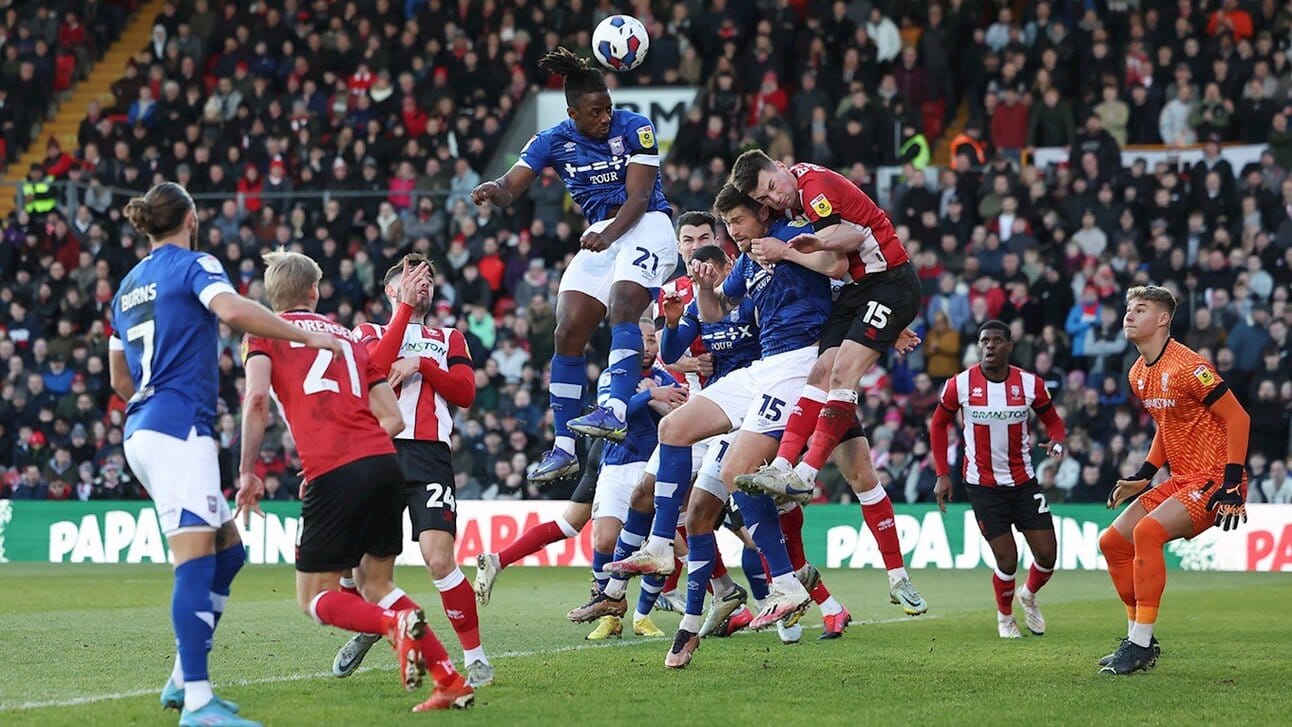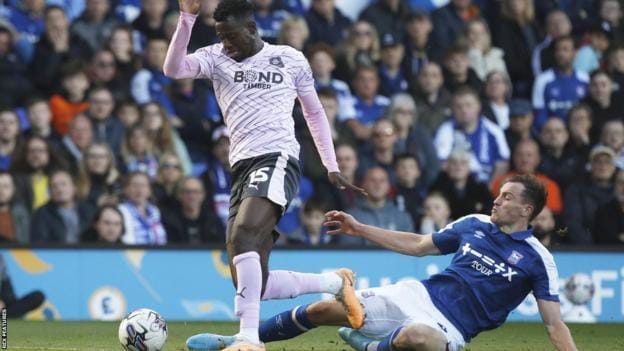- Blue and White Notes
- Posts
- Waved Away
Waved Away
Why we, you, they, can't buy a pen
Entering the final ten minutes of Ipswich Town v Port Vale, all sorts of scenarios played themselves out in my mind. If we draw, who have Sheffield Wednesday and Plymouth got next? How many points would we need to be sure? What result would we need at Peterborough and Barnsley? Would we need to win at Fleetwood on the final day?
Time ticked on and we looked no more potent, no more likely to undo the damage inflicted by the Valiants’ combative and composed first half performance. We worked our way patiently round their low block a dizzying number of times, until finally the ball found its way to Harry Clarke. Confronted by a crowded penalty area, Clarke rolls the dice and hits it, hard, at an area he thinks might be dangerous. It hits a hand and 28,000 scream for a penalty. The ball returns to Clarke, who re-applies the same hammer to the same nail and once again finds limb rather than torso. He screams, beseeches the referee, arms outstretched, almost falls to his knees. Luke Woolfenden is sprinting towards the referee, also yelling. The 28,000 are a perfect chorus – “handball!” The referee’s left arm straightens, he points, he blows, he awards the last meaningful penalty we have had in the league.1
A crucial, potentially season defining decision, which, I’m convinced, was made entirely on vibes. That is not to say it was an incorrect decision, rather that whether it was correct was entirely immaterial to the whistle blowing. The two incidents in quick succession, the rising temper of the attacking team, the ascending desperation of the home support, they made the referee look, they persuaded him to think. Usually, whatever the merits of your claim, you get a dismissive wave of hands rather than a friendly whistle.
One of my strong football beliefs is that there are both way too few and way too many penalties. Way too few because the game isn’t officiated in the same way inside the box and if it were there would be four times as many spot kicks. There are whole categories of foul that don’t exist in the area. Notoriously, grappling whilst competing in the air goes almost entirely unpunished, to the point where the concession of such a penalty, as against Lincoln last year, is greeted with stunned disbelief. Amongst pundits, you’ll often hear the lament “if that’s a pen, you’d have to give five a game”, essentially admitting that this aspect of the game is so lawless, the rules have become unenforceable.

To aerial clashes, you can add late tackles. There is an iron rule that any player who successfully manages to complete a shot or a cross in the 18-yard box is ineligible for a penalty. If the contact comes after you got rid of the ball, you get nothing. This is, of course, an inversion of refereeing logic elsewhere on the pitch. We had an example on Tuesday Night at Rotherham, with Kayden Jackson’s tackler arriving half a second after he completed his cross and taking Jackson out. A foul for certain the other side of the line but no chance here. This is before a whole world of other penalty box fouls, where referees apply a high bar for “sufficient contact” that isn’t applied elsewhere on the pitch, while dishing out low-stakes free kicks willy-nilly to any defender who gets breathed on whilst shielding the ball.
Way fewer penalties than the rules should dictate, but in another way, still too many. All these special penalty box rules underly an unspoken truth, that most penalties are disproportionate punishment. Referees, pundits and former players all hate penalties, they pooh-pooh almost every appeal. In my view not because they don’t understand the rules, but because they instinctively dislike the unearned reward. The majority of penalties are like a little divine gift for the attacking team. A free shy at goal that absolves them of actually having to break the other team down. Most penalties involve situations where the attacking team have almost no chance of scoring. Players running away from goal, towards the byline or the touch line, players looking for space to cross, crosses or shots into packed penalty areas that touch a hand. Like the penalty Clarke won against Port Vale, the threat is minimal, the penalty award a minor miracle. The phrase “Not for me, Clive” is almost more of an ethical standpoint than a comment on the actual decision made.
This is one reason why I don’t tend to get too hung up on nights like Rotherham where we can’t seem to buy one. There were four incidents last night where Rotherham committed what are, within the laws of the game, fouls. The late tackle on Jackson, a hack at Hirst’s ankle and two plausible hand ball shouts. Only really the Hirst tackle robs us of a clear effort on goal and even then, Hirst is wide-ish and has the ball stuck under his feet. Of course, I want us to be given penalties in these situations, not least to offset having penalties given against us. But I find it hard to mount much of a sense of injustice when we’ve struggled to create clear chances. It’s nice to get a freebie from time to time, but I don’t feel entitled to it.
I do wonder though if lately the attitude that teams don’t really deserve penalties has started re-shaping refereeing even more in the defenders’ favour. We are yet to see a spot kick in an Ipswich Town match this season, either for or against us. And we are not alone, Watford fans haven’t seen any 12-yard action either. Both of those are statistically a bit unusual, on average a Championship game saw a penalty once every 5.38 games between 2018-19 and 2022-2023. This was slightly less than the Premier League, which averaged one every 4.32 games over the same period, a gap which might be an effect of VAR handballs alone. We’ve seen even fewer penalties in the Championship this season – just 30 penalties have been awarded across 15 matchdays - an average of one every 6 games (an 11 per cent drop in frequency).2
This might just be a small sample size and a bit of normal variation but there are a couple of possible explanations. One is VAR. There’s a fair bit of traffic in refereeing terms between the top division and ours, so it might be that the dominant practices from the Premier League are shaping Championship refereeing too. If VAR has made officials more cautious in big decisions, safe in the knowledge that the worst calls will get overturned, you might speculate that the VAR-less Championship would see fewer match-changing calls just out of habit and culture, but without the scrutiny of the video ref to balance things out.
Another explanation, more persuasive to me, is that in 2021 referees were instructed to stop giving “soft penalties”, an order that was apparently reiterated in the Summer of 2022. Specifically, referees were asked to start evaluating whether “contact” in penalty box tackles was sufficient to force the attacking player over and to also consider the attacker’s “motivation”. Now, Summer instructions from Professional Game Match Officials Limited (PGMOL) are notorious for only ever being enforced in August. We saw this in 2023-24 with timewasting, where we saw a flurry of yellows in our first few games, but barely anything from September.
However, when the instructions fit with the existing culture amongst referees and players (which is errs against giving most penalty box fouls) and when they’re constantly re-iterated, it becomes likelier that they get internalised over time. You have referees who don’t really want to give penalties, now with a huge subjective grey area (How hard did he kick him? Did he really try to stay up?) with which they can dismiss most appeals. The result would be fewer penalties and more cautious decisions like the one George Edmundson benefited from against Plymouth.

I’m fine with fewer penalties in general, but I do wonder if it would be better if football made more dramatic changes. We dance around the problem that the penalty constitutes cruel and unusual punishment for most in-area offences and then over-design rules and over-instruct to keep the number awarded under control. As a result we end up with very different refereeing conditions in different parts of the pitch.
Rather than do that, why not make a whole range of offences in the box free kicks instead? If hand balling a bobbling ball that isn’t goal bound or wiping someone out after they’ve got their (bad) cross away isn’t worth 80% of a goal, have another sanction for it. Save the referee the angst of deciding whether the match needs to be flipped on its head over clipping a players heel as he runs away from goal. Why not just leave penalties for the denial of a goalscoring opportunity, thus replacing like for like? That way referees could police the most crucial part of the pitch the same way they do every other part, reducing inconsistency. Perhaps that kind of fundamental reform is the only way we can get round this endless cycle where refs have to routinely answer for a system that generates plentiful fouls in the box, but only seldom the top available punishment.
Reply